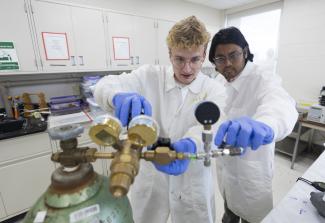A bachelor of science degree in materials science and engineering (MSE) prepares students for impactful, financially rewarding careers in industry, challenging and dynamic futures as innovators or entrepreneurs and advanced graduate study in a range of fields.
The materials science and engineering program is:
- Hands-on! Students have open-ended lab courses every year starting in their sophomore year.
- Current and relevant! Every student completes a senior design project in partnership with industry, addressing a current problem proposed by our industry partners!
- Personal! The MSE program is small enough that every faculty member will know your name, but large enough to offer a wide range of connections.


